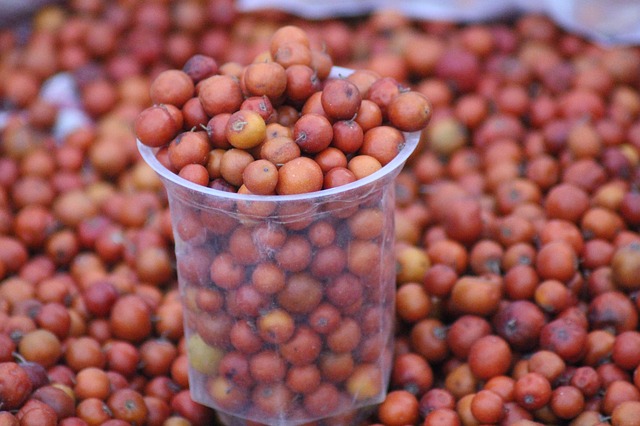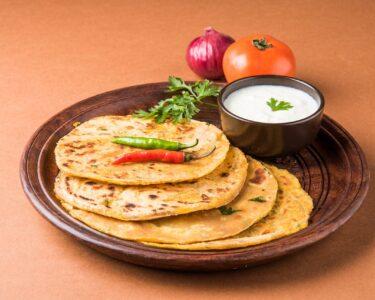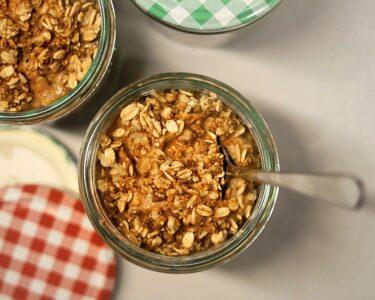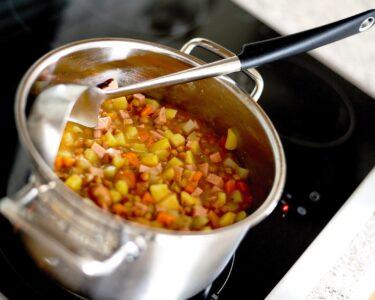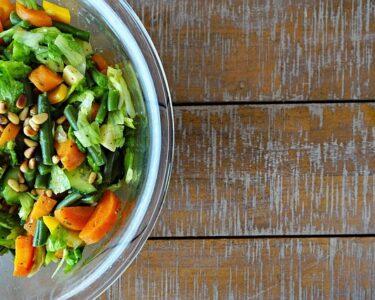No guys, it is not my innovation, it is a time-tested Bengali recipe that I thought worth sharing in this season. Yes, I am talking about Bong’s favorite Kuler achar – ber (Indian jujube) pickle.
Ber is an Indian superfood. It’s not only nutritious, loaded with antioxidants, nutraceuticals which promotes multiple health benefits. (1,2) So those who are still banking on blueberry, raspberry, avocado, or kiwi, think smart and go desi this season.
I am someone who loves to follow tradition especially in terms of food. Here in Rourkela, Odisha ber is grown abundantly. On my campus, there are so many ber trees here and there, but surprisingly 95% of fruits are just spoiled, no one feels the urge to preserve them. Every year I prepare almost 15 kg of ber pickle and enjoy throughout the year with my meals. All you need is a little effort to make this mouth-watering pickle.
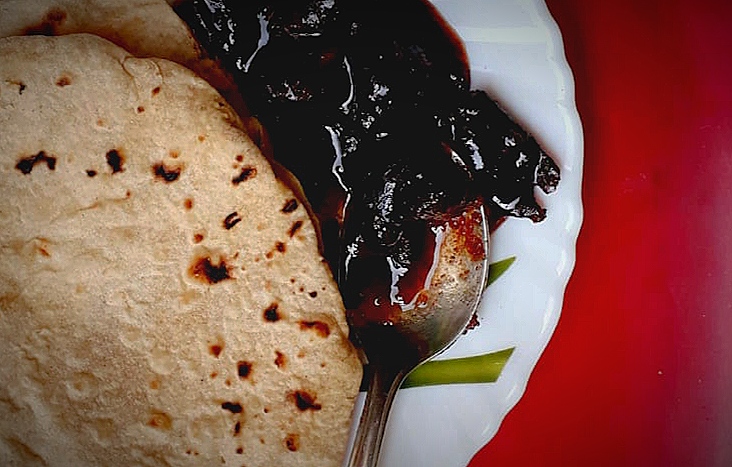
Being a nutritionist, the curiosity with nutritive value and health benefit is inevitable, right? That’s how I started my research on ber and guess what? I was completely surprised to see the numerous health benefits of this local fruit.
Despite being a cheap fruit, jujube remains to be a less popular fruit, especially among the young generation in comparison with mango, apple, and orange. This is mainly because the common consumer has no information about its health-promoting effects. (4, 5)
How to make ber pickle at home?
Preparation of ber pickle is easy. You need just a few ingredients which are listed in table-1. Anyone can prepare ber pickle with their little effort and time.
Type of Recipe: Home-made pickle, Bengali cuisine
Cooking Time: 45 minutes
Preparation time: 3 days (Don’t panic in includes maturing time)
Ingredients required:
| Ingredients Required | Amount |
| Ber or baer or Indian jujube | 1 Kg |
| Jaggery (veligur / lump jaggery) | 650 g |
| Black Salt | 5g |
| Cumin seeds | 2g |
| fennel seeds | 2g |
| Chilli flakes | 2g |
| fenugreek seeds | 2g |
| Black cumin seeds | 1g |
| Black mustard seeds | 1g |
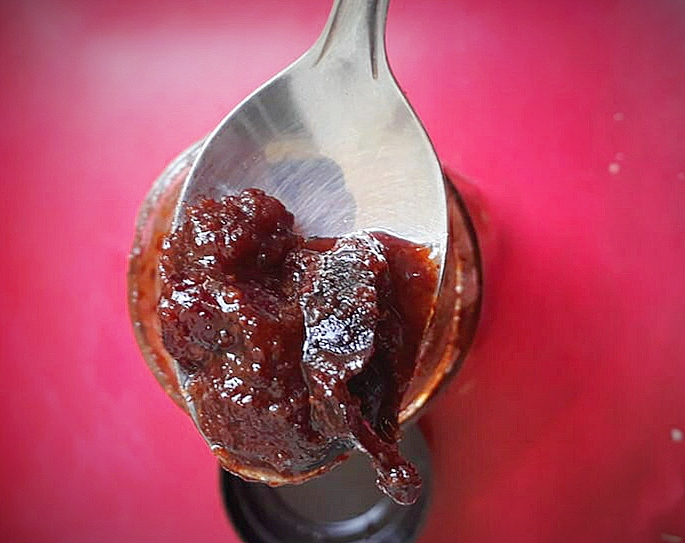
Recipe of ber pickle
- Collect fully matured, fresh, ripe baer from your locality or purchase it from the local market.
- Select the best quality ripe fruits, discarding all spoiled or damaged fruits
- Wash them under running tap water
- Soak them in saline water for 10 minutes.
- Drain excess water, remove the adhering water by drying them between the folds of a dry, clean cloth.
- Add 10g of salt with the whole ber and mixed well.
- Spread the ber on a tray and kept it under the sun for 2 consecutive days.
- Now your sun-dried baer or ber or kul is ready for making anchar.
- Take a deep, hard container, add 1 litre of water, heat it, and add all the jaggery, stir occasionally to make it dissolve into water and to avoid adhering the jaggery at the bottom of the container.
- Add all the sun-dried ber to the hot jaggery syrup, cook for 15 to 20 minutes at low to medium flame.
- When a thick consistency of the pickleis achieved, the gas should be turned off.
- Now roast all the spices (namely cumin, black cumin seeds, fennel seeds, black mustard seeds, fenugreek seeds, 2 whole red dry chilli) in a shallow pan, grind them using a grinder. 10g of this freshly prepared spice mix powder should be added to the ber pickle and mix well by stirring.
- Kept the pickle as it is for an hour, whenever it is cooled to room temperature, transfer the anchar (pickle) in a clean, dry, glass jar, cover the mouth with a clean cloth, and kept it under the sun.
- For the 1st week, the freshly prepared pickle should be kept under the sun for at least 3-4 hours in a day. After that, the pickle should be given under the sun once in a week, for 4 hours.
Nutritive value of Ber pickle
100g of Ber pickle provides approximately –
- 198 Kcal of energy
- 48g of carbohydrate
- 0.6 g of protein
- 0.22 g fat
- 34 mg calcium
- 21 mg phosphorus
- 1.4 mg of iron.
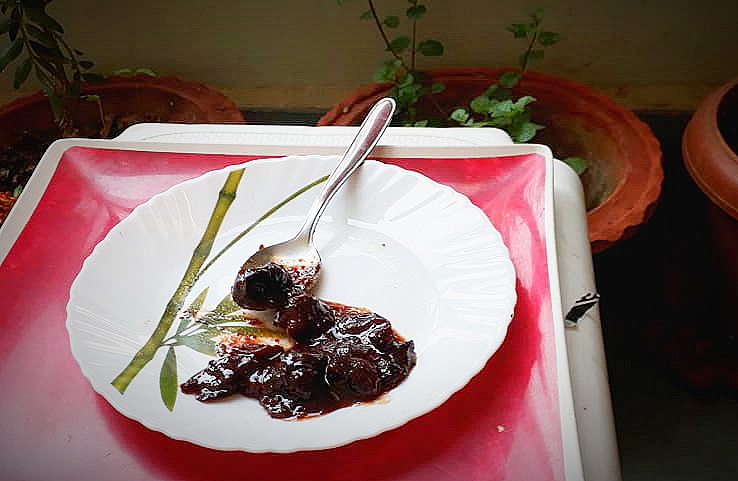
The nutritive value of ber pickle indicates that it is a low protein, low-fat tasty recipe supplying a moderate amount of energy and carbohydrate. Additionally, it provides a certain amount of minerals to our diet.
The importance of a ber pickle is not limited to its nutritive value. Moreover, it is an excellent source of antioxidants since ber is rich in antioxidants. Further, ber help to satisfy our appetite.
Since this sweet recipe, having high satiety value, is not high in calories, instead of rich in antioxidants, it can be taken by obese persons too, but obviously in moderate amounts.
Comparison of Nutritive value of fresh ber fruits (ripe) vs home-made ber pickle
| Nutrient content | Fresh ber fruits (ripe) | Home-made ber pickle |
| Energy (Kcal /100g) | 74 | 198 |
| Carbohydrate (g /100g) | 17 | 48 |
| Protein (g /100g) | 0.8 | 0.6 |
| Fat (g /100g) | 0.3 | 0.22 |
| Calcium (mg /100g) | 4 | 34.4 |
| Phosphorus (mg /100g) | 9 | 21.4 |
| Iron (mg /100g) | 0.5 | 1.36 |
It indicates that-
- The energy value of ber pickle is 2.5 times more than that in fresh ripe ber fruits. Addition of jaggery increases the calorie content of ber pickle.
- The carbohydrate content also 3 times higher in preserved ber (pickle) than that that in fresh fruits (ripe ber). Jaggery used in the recipe is a pure carbohydrate which greatly increases the carbohydrate content in the preserved form.
- There is only a negligible change in protein and fat content. Both the fresh fruits and their preserved counterparts are a very poor source of these two macronutrients.
- The calcium content is 8.5 times higher in ber pickle compared fresh fruits. This happens because ber is a good source of calcium.
- The phosphorus content of the pickle is also more than double in preserved counterpart. This is due to the amount supplied by jaggery.
- Likewise, the iron content also doubles due to the added amount provided by the jaggery.
Storage of Ber pickle
- Ber pickle can be kept for 12 months without any refrigeration. But it should be exposed under the sun once in a week and kept for at least 4 hours.(9)
- You can also keep in the refrigerator.
- It is better for you to use a glass container for storing ber pickle rather than using a plastic container.
How ber pickle is preserved without using any preservatives?
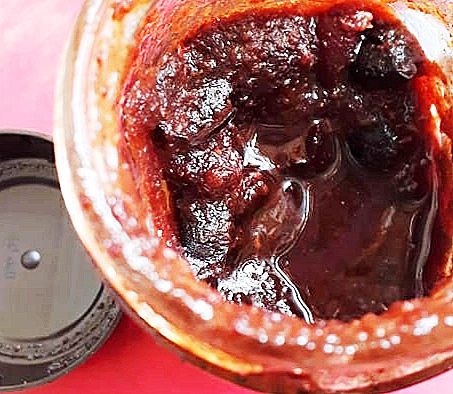
Preparation of pickles from easily available, low-cost seasonal fruits is an Indian tradition. The preparation process involves certain steps and ingredients which reduces the risk of spoilage of the pickle and greatly increase the shelf life of the recipe.
Importance of ingredients and preparation steps to improve the shelf life of ber pickle
| Steps and Ingredients used | Importance |
| 10 minutes soaking in water | This removes insects naturally present in ber |
| Adding 10 g salt with 1 kg ber | Protect the bers from spoilage, Ensures rapid drying during the sun-drying process. |
| Sun-drying for 2 days | Reduces the water content of the fruits, Improves the taste of ber |
| Addition of jaggery | Reduces the availability of water to food microorganisms, thus reducing the risk of spoilage. |
| Application of heat during cooking | Kills microorganisms, Further reduce the water content of sun-dried bers. |
| Addition of spice | Improves the taste and helps to preserve the pickle. |
So, we are not adding any artificial preservatives but applying natural preservatives (jaggery, salt, and spices) and using preservation methods (like drying and heating).
Nutritional benefits of ber or Indian jujube
- Ber is a low-calorie fruit, rich in micronutrients like vitamins and mineral but it is a poor source of macronutrients like protein, fat and carbohydrate.
- Ber contains good amounts of vitamins (like beta carotene, B-complex vitamins and vitamin-C) in comparison to other fruits.
- It is also rich in calcium and phosphorus.
- It is an excellent source of several antioxidants.Caffeic acid, p-hydroxybenzoic acid, ferulic acid and p-coumaric acid are predominant phenolics present in ber which is responsible for its significant antioxidant activity, reducing power activity and scavenging of free radical activity.(5)
The medicinal value of ber or Indian jujube
Ber has many health properties including– (5)
- Neuro-protective properties
- Stress relieving
- Blood pressure lowering
- cardio-protective
- immuno-stimulant effects,
- antifungal, antidiabetic,
- anti-allergic,
- antiulcer,
- anti-inflammatory,
- anti-bacterial.
Ber is a moderate-cost, tasteful fruit. Ripe ber is abundantly available in Indian markets in only two months (February and March) which is the season for it. (6)
But in spite of its high nutritional, medicinal, and nutraceutical potentials, it is not consumed throughout the year, because of the fact that it has a high water content (around 82%) which makes it highly perishable. (7)
The fruit remains in good condition maximum for 4 to 5 days. (3)
But it is worthy to preserve. Even today, several types of ber products (like ber powder, jujube seed powder, dried ber, etc.) are available in the market. Ber pickle is also available.
Usually, these commercially processed pickles contain artificial colors, preservatives, and other chemicals.
To avoid artificial chemicals, you can collect ber fruits and preserve them as ber pickles using a few common kitchen ingredients. Yes, I can guaranty you, that your homemade ber pickle will taste better than the commercially available pickle. Moreover, it does not contain any preservatives but the pickle can be kept for more than a year, even without refrigeration.
Bottom Line
Enough of kiwi, avocado, raspberry, or blueberry. Fix your health issues, antioxidant requirements with ber this season. Eat ber fresh, make a pickle following the recipe mentioned above. No, it does not require any technical know-how or any special equipment. Using our kitchen utensils and commonly available kitchen ingredients, prepare this mouth-watering pickle and enjoy the goodness of ber throughout the year without using any preservatives. So, this weekend let’s try the recipe.

